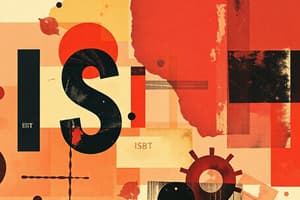Podcast
Questions and Answers
What type of antibody is most commonly found in the plasma of individuals whose red cells lack the corresponding A or B antigen?
What type of antibody is most commonly found in the plasma of individuals whose red cells lack the corresponding A or B antigen?
- IgE
- IgM (correct)
- IgA
- IgG
What are the two structural genes that compose the Rh blood group locus?
What are the two structural genes that compose the Rh blood group locus?
- RhD and RhCE (correct)
- RhD and RhE
- RhA and RhB
- RhC and RhF
Which phenotype indicates the absence of the RhD gene?
Which phenotype indicates the absence of the RhD gene?
- Rh D0
- Rh D- (correct)
- Rh D+
- Rh D?
What types of antigens are carried by the membrane proteins encoded by the RhD and RhCE genes?
What types of antigens are carried by the membrane proteins encoded by the RhD and RhCE genes?
In individuals with the Rh D+ phenotype, which gene is typically present?
In individuals with the Rh D+ phenotype, which gene is typically present?
Flashcards are hidden until you start studying
Study Notes
Antibodies and Blood Types
- Naturally occurring antibodies against A and/or B antigens typically consist of IgM.
- These antibodies are found in plasma of individuals with red blood cells that lack the corresponding antigen.
Rh Blood Group System
- The Rh blood group locus includes two structural genes: RhD and RhCE.
- RhD gene encodes the membrane protein that carries the D antigen, while RhCE carries Cc and Ee antigens.
- Presence of the RhD gene results in the Rh D+ phenotype, while its absence leads to the Rh D– phenotype.
Studying That Suits You
Use AI to generate personalized quizzes and flashcards to suit your learning preferences.




